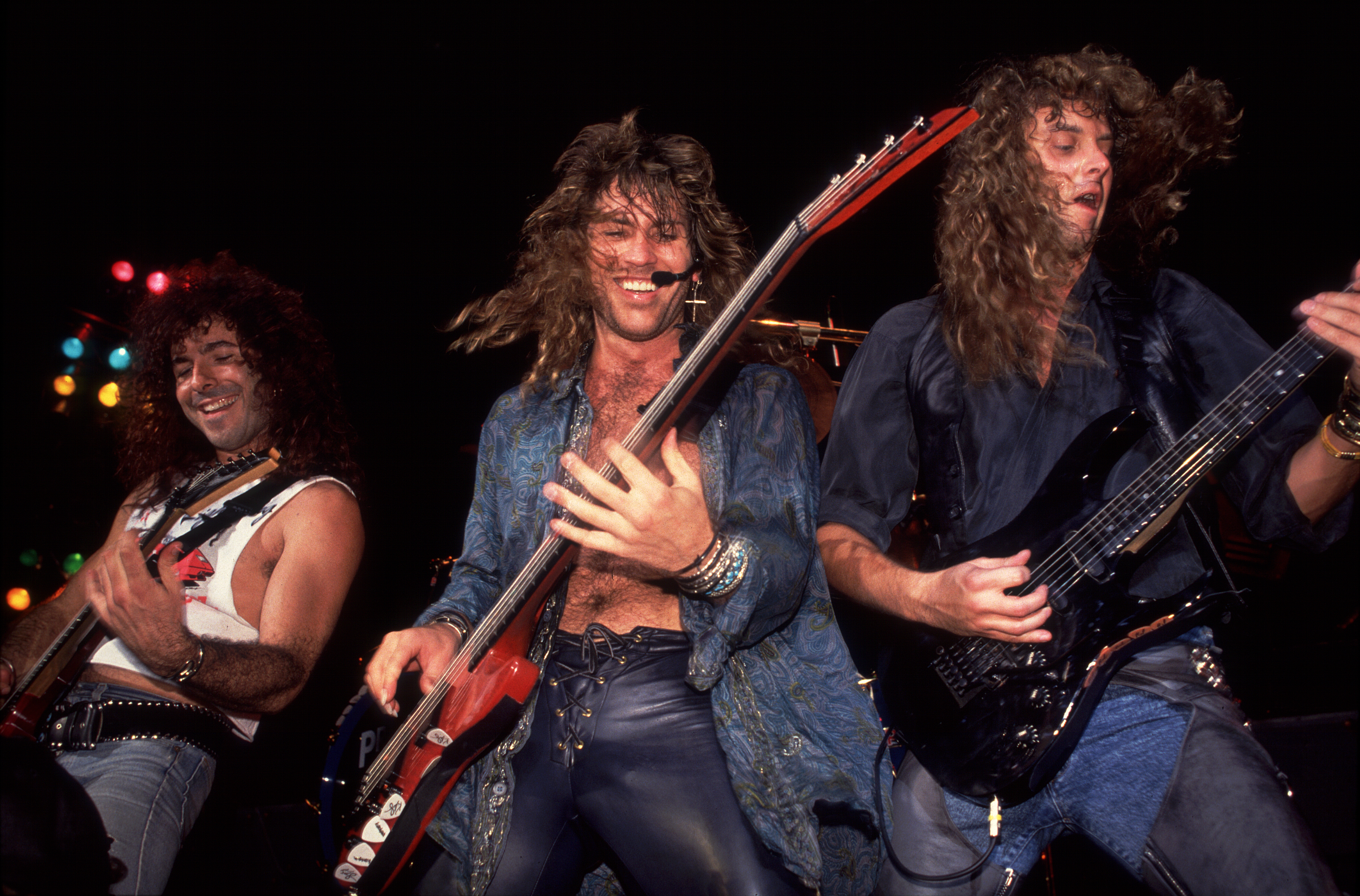“I followed Jeff Watson into Night Ranger; it was pretty intense, I had no idea how to do that eight-fingered thing he does”: From Winger to Dokken, Whitesnake, Night Ranger, and his solo albums, Reb Beach looks back on his career, and his greatest solos
Four decades down the road, the Winger guitarist explains to GP that the band deserved far more than the ‘hair metal’ label

Winger were giants of the hair metal era, scoring hits and becoming a fixture on MTV with heavy rotation for their over-the-top videos. Like many bands of the era, they suffered the backlash of the grunge movement in the early 1990s when, almost overnight, the excess and extravagance of the big-production metal bands ran up against a cultural movement that considered the notion of fun in music to be almost obscene.
Ironically, as we’ll see in guitarist Reb Beach’s five song selections, a fair amount of Winger’s musical output was actually a departure from the bright and glossy excesses of the big, radio-friendly hits.
We still eat lunch together every day when we’re on the road
There are few bands that can say they still have their founding members 40 years down the road, and Winger are one of them.
“Offhand, I can’t think of any bands who still have their original lineup from when they broke through,” Beach says. “The thing is, there are no jerks in the band – no big egos. In most bands there’s always one guy who’s a real asshole, but not in Winger. We’re all pros. We’ve all been in a ton of bands, and we know how to do our jobs and never complain. We’re great friends. We still eat lunch together every day when we’re on the road.”
The band’s most recent release is Seven, their first album since 2014’s Better Days Comin’. Beach says he’s been delighted with the response to it. “People are really loving this album more than anything that we’ve done since Pull in 1993,” he explains. “I was thinking it was maybe too dark and intense, but it seems to have touched people who like our music, which has been super positive. It’s Kip’s baby, for sure. I bring him a bunch of ’80s riffs and he crafts them into something musical.”
Beach played with many high-profile bands when Winger went on hiatus in the early ’90s, and spent more than 20 years in Whitesnake – no mean achievement, given the revolving-door policy of main man David Coverdale. “I’m pretty easy to work with,” Beach says. “I don’t make waves, I show up on time, I learn the parts and I’m never the problem.”

In addition to Whitesnake, Beach took over George Lynch’s guitar duties in Dokken. “I also followed Jeff Watson into Night Ranger, which was pretty intense, as I had no idea how to do that eight-fingered thing he does. That definitely wasn’t going to happen,” Beach declares with a laugh. “I had to figure out a way around that.
“And Lynch, that was definitely a tough one! The first Dokken gig that I did, I got a sneaker thrown at me, but I always played the exact same solo live as on the original records. I think people liked that in the end, because George would always play different things each time they did the songs.”
Keeping up with change seems to be one of Beach’s strengths. He recalls being unfazed by his rapid change of fortune when Winger became major-league heavy hitters. “I don’t mean this to sound in any way egotistical, but I was voted most likely to become a rock star at high school,” he explains. “As soon as I saw Kiss, I knew that was what I was going to do. I was hungry and tenacious.
“As soon as I could, I left home to sleep on the floor of a friend’s apartment in New York while I tried to get work as a guitarist. I got a job as a singing waiter and I pounded the pavement doing sessions for 50 bucks. I got my foot in the door and kept pushing. I knew I would eventually make it into a big band – I’d been preparing and working for it my whole life, right up to the point that it finally happened.”

Success for Winger wasn’t quite what Beach expected, at least not when it came to the financial rewards. “Winger signed one of the worst contracts in music business history,” he maintains. “I have a friend who studied music law, and he told me that they spent a whole day looking at the deal that we signed. We signed through our producer, Beau Hill, and he made all the deals and refused to take any kind of advance for us.
“I had to look at Mick Brown from Dokken driving a Lamborghini, when all I had was a Subaru.” He laughs at the memory. “These guys were getting advances for millions, you know? We spent so much money on our videos – they were a couple of hundred thousand apiece – plus all our recording costs, that we were never recouping the money that was spent on our behalf, until 20 years later when out of the blue I got a check for 20 grand!”
As far as Beach is concerned, his only focus for the foreseeable future is Winger. “It’s Winger all the way,” he declares. “We decided that we’d really focus on booking the crap out of Winger all over the world and really work things to the max.”
As for the mistakes Beach has made over the years, he has absolutely no regrets. “I wouldn’t change anything,” he says. “The terrible Winger recording contract was probably the only way we could have got signed, and everything else that I got in life led from that point. I got to be on the cover of the guitar magazines, and that was way better than working a regular job.
“I’ve never lost the thrill of getting up onstage and seeing that what I’m doing is moving people who’ve paid to come and see me. That’s really what makes everything worthwhile.”
1. Junkyard Dog – Winger (Pull, 1993)
“I picked this one because so many musicians come up to me and the first thing they always say is what a great album they think Pull was. And the second thing they say is how they play this song for people who think they know Winger, and it blows their minds every time. It’s a great, sinister riff. It’s really heavy and it really rocks. The whole song is very straight-ahead. I think it is so direct that people just get it right away – this dense chugging riff that’s not too out there.
“There is a lot going on in the arrangement, and that keeps the attention focused for the listener. And, of course, it morphs into another song, Tears on Stone, which is a really interesting transition. By this time, playing for the song was much more important to me than looking for an opportunity to shred. That was something I’d learned early on from doing sessions.
“Of course, when we did the first Winger album, I was looking to play every trick I knew at every opportunity – that was my chance, you know? [laughs] This is one of my all-time favorite Winger songs, plus, I’m a huge Aerosmith fan and it has a really cool change in it that reminds me of Seasons of Wither, which I think is pretty cool.”
2. Down Incognito – Winger (Pull, 1993)
“This is one of the best riffs that I’ve ever written, yet it’s a totally radio-friendly pop song, but unlike anything you heard from any of those ’80s bands back then. There’s a ton of air in the arrangement – even the riff has a lot of air in it – and the chorus was huge, of course.
“The problem we had was that Nirvana had just come out, and all the radio station people we talked to told us, ‘Man this would have been huge if it had been released at a different time,’ but they just couldn’t play it, because it was Winger. We were really going against the grain of bands like Nirvana and the other grunge acts in the minds of the people who were controlling the airwaves. It kinda broke our hearts, because we thought this was a great song. It’s funky, and it even has a harmonica solo, which was pretty unique.
“We had a $300,000 budget to record Pull. We had three 32-track digital Otari tape machines running at the same time, and we were really meticulous about perfecting everything. For every song, I did four guitars playing exactly the same thing and two guitars playing single notes an octave lower on every song. I also played two guitars with Nashville tuning, so I was also playing all the parts an octave higher.
“We tried a ton of amps, but in the end it was the Mesa/Boogie Rectifier that was picked for all the songs, with my Pensa Suhr being the guitar of choice.”
3. Train of Thought – Reb Beach (The Fusion Demos, 2001)
“This was from a time when Winger disbanded for a little while and I just figured I’d be a fusion guy. I thought, ‘I’m famous now.’ But when I picked up the phone to make calls, no one would take my call. [laughs]
“Originally, I was thinking that I wanted to do what I did before I joined Winger, when I was a session guy. I used to go home from all these different sessions and work on writing a lot of fusion demos for the album that I wanted to make, because I always wanted to be a Joe Satriani sort of player. Another of my favorite artists is Larry Carlton, so that’s somewhere around the ballpark that I was aiming for.
“The actual sound on this track is terrible really, but that’s just the way I did it as a demo when I recorded it in 1986. The guitar was recorded through a Rockman, or something like that, rather than an amp, and you can tell, because the guitar sound is tiny.
“I think the keyboard riff on here is great. This was in fact the first fusion song that I wrote. I tried to get a deal with Mike Varney at Shrapnel with these demos, but they knocked me back because it wasn’t metal. I did meet him years later and he told me he really regretted that he didn’t sign me, which made me feel a little better.”
4. Fanatic – Reb Beach (Masquerade, 2002)
“I always wanted to write a song that had a recurring riff so that you could play the same bass part throughout the song. I always thought songs like that were so clever. When I came up with the riff for Fanatic, I realized that I could change the chords under it and it would then become the pre-chorus, which I thought was a cool idea.
“There’s a really great buildup in the song, and then at the end I pulled a total Aerosmith where I did those Hendrix-style unison bends on the B string up to the same note on the E string, in half steps over the riff, which turns the feel around. There’s also a hint of Zeppelin’s Immigrant Song vibe in what I played. I think it’s a song that mixes elements of great ’80s and ’90s rock, even though it was recorded in the 21st century.”
5. Witness – Winger (Karma, 2009)
“I picked this one because I think it’s the best solo that I ever recorded – in fact nearly half the song is my solo. [laughs] There was a lot of pressure on me from Kip, who said that he was specifically writing the outro so that I could try to top what I did on [1988's] Headed for a Heartbreak, so that I could show the people that I’ve still got it and could do those long solos that really build.
“It made me a bit nervous, and when we went to record it, I was really bad – I mean it was scary bad. Kip was getting really frustrated as well. I said we should go to the pub, where I had a couple of beers, and as soon as we got back, I said, ‘Okay, I’m ready.’
“We just went straight for it, and that was the solo that I came up with – a total, absolute first take. Kip was jumping up and down in delight. A lot of people have said it’s my best solo. I know it’s definitely out there a little bit, but it’s totally from the heart.”
Get The Pick Newsletter
All the latest guitar news, interviews, lessons, reviews, deals and more, direct to your inbox!
Mark is a freelance writer with particular expertise in the fields of ‘70s glam, punk, rockabilly and classic ‘50s rock and roll. He sings and plays guitar in his own musical project, Star Studded Sham, which has been described as sounding like the hits of T. Rex and Slade as played by Johnny Thunders. He had several indie hits with his band, Private Sector and has worked with a host of UK punk luminaries. Mark also presents themed radio shows for Generating Steam Heat. He has just completed his first novel, The Bulletproof Truth, and is currently working on the sequel.
“We’d heard Jimi Hendrix, we'd heard the Who, but now we finally got to see these guys. And watching Jimi Hendrix burn his guitar….” Grace Slick on Hendrix at Monterey, Jefferson Airplane and the Spanish origins of “White Rabbit”
“I’m still playing but I’m covered in blood. Billy’s looking at me like, ‘Yeah! That’s punk rock!'” Steve Stevens on his all-time worst gig with Billy Idol — and the visit to Jimi Hendrix's grave that never happened















